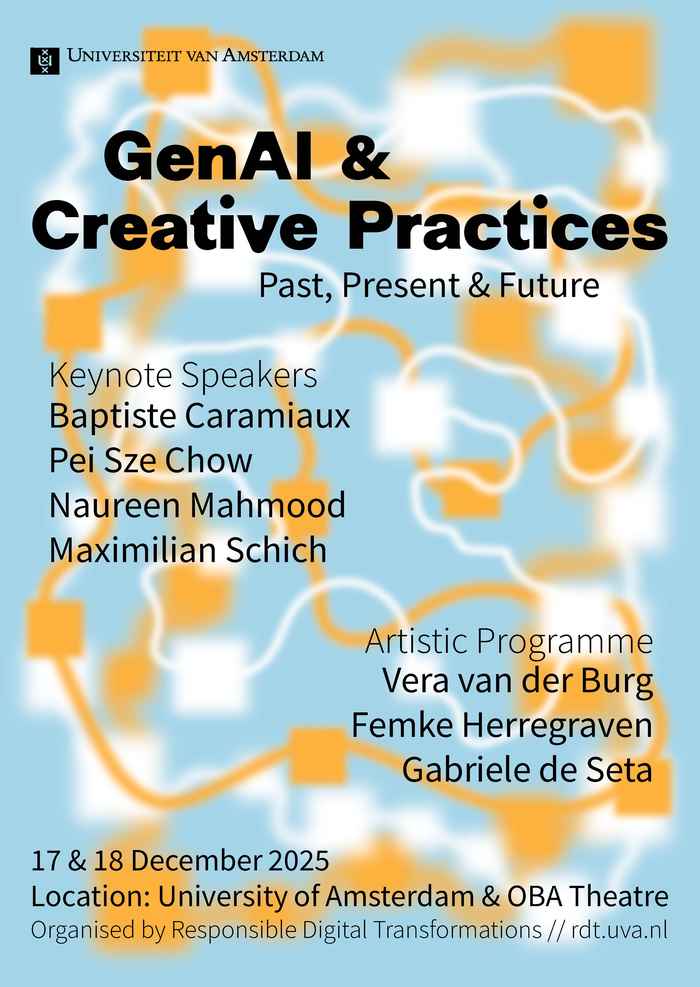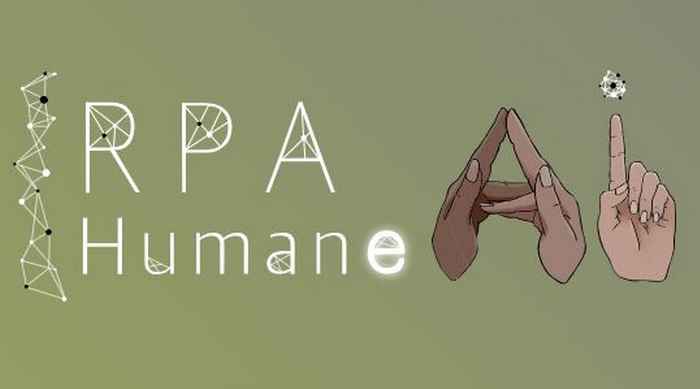GenAI & Creative Practices: Artistic programme
Artists: Vera van der Burg, Femke Herregraven, Gabriele de Seta
- Date
- 17 December 2025
- Time
- 17:00 -19:00
- Location
- OBA Theater

Bringing together research, art, and experimentation, the artistic programme situates artistic practice as a vital mode of inquiry within broader conversations on generative AI.
The programme is curated by Tobias Blanke, Sabine Niederer, Bokar N'Diaye and Eftychia Stamkou and supported by the RPA Human(e) AI, the Deep Culture project, and the AARTSS lab.
The artistic programme is part of the international conference GenAI & Creative Practices: Past, Present, and Future, organised by Responsible Digital Transformations. This conference will bring together scholars, researchers, and practitioners to critically examine the evolving relationship between Generative AI (GenAI) and creative work.
About the artists
Vera van der Burg
Vera van der Burg is a designer and researcher pursuing a PhD at the Designing Intelligence Lab at TU Delft. In her work, she challenges prevailing narratives about AI by approaching these systems not as purely optimizing machines, but as tools for reflection. Vera advocates for "Reflective AI" – developing slower, thoughtful approaches to artificial intelligence in creative practices. She holds degrees in neuroscience (Utrecht University) and contextual design (Design Academy Eindhoven). Her practice-based research—spanning installations, publications, and workshops—has been featured at Dutch Design Week, Salone del Mobile, and conferences including DIS, DRS, and CHI, and awarded with the Emerging Talent Dutch Design Award 2025.
Vera will discuss her research on Reflective AI and the development of slow engagement practices with artificial intelligence. She explores ceramic making, autoethnographic research, and first-person design methodologies—expressed through sculpture, installation, and practice-based inquiry—to challenge efficiency-focused paradigms and examine AI as a reflective medium rather than a tool for optimization.
Femke Herregraven
Femke Herregraven’s work explores the effects of abstract value systems on landscapes, ecosystems, and daily life. Her research into the interaction between financial markets, risks, and the physical world forms the foundation for her iterative sculptures, drawings, films, and hybrid installations. Over the past decade, she has focused on financial, geological, and climatological self-organising systems that both shape and disrupt daily life. Her work employs multiple textual, computational, and gestural languages, expressed through image, sound, drawing, and speculative fiction, to reflect on how these contemporary future models shape the experience of reality and the very ground on which it stands. She has exhibited internationally at institutions including Centre Pompidou (Paris), Tate Modern (London), Stedelijk Museum (Amsterdam), Reina Sofia (Madrid), and at the Gwangju and Taipei Biennials. Herregraven is an alumna of the Rijksakademie (2017–18) and recipient of the Evens Arts Prize (2023) and Theodora Niemeijer Prize (2025).
Femke will discuss her research on the modelling and financialization of the future and her artistic approaches to artificial intelligence. She will unpack how she employs textual, computational, and gestural languages through image, sound, drawing, speculative fiction, and simulation to reflect on how these contemporary future models shape the experience of reality and the very ground on which it stands.
Gabriele de Seta
Gabriele de Seta is, technically, a sociologist. He is a Researcher at the University of Bergen, where he leads the ALGOFOLK project (“Algorithmic folklore: The mutual shaping of vernacular creativity and automation”) funded by a Trond Mohn Foundation Starting Grant (2024–2028). Gabriele holds a PhD from the Hong Kong Polytechnic University and was previously a Postdoctoral Researcher at the Institute of Ethnology, Academia Sinica and at the University of Bergen, as part of the ERC-funded project Machine Vision in Everyday Life. His research, grounded in qualitative and ethnographic methods, focuses on digital media practices, sociotechnical infrastructures, and vernacular creativity in the Chinese-speaking world. He is also interested in experimental, creative, and collaborative approaches to knowledge production.
Gabriele’s intervention examines the current state of generative audio across models and modalities. Starting by provocatively pitching two understandings of synthesis against each other, he presents explorations into synthetic audio that showcase how it can serve as an entry point into the complex multimodal assemblages of contemporary deep learning technologies.
